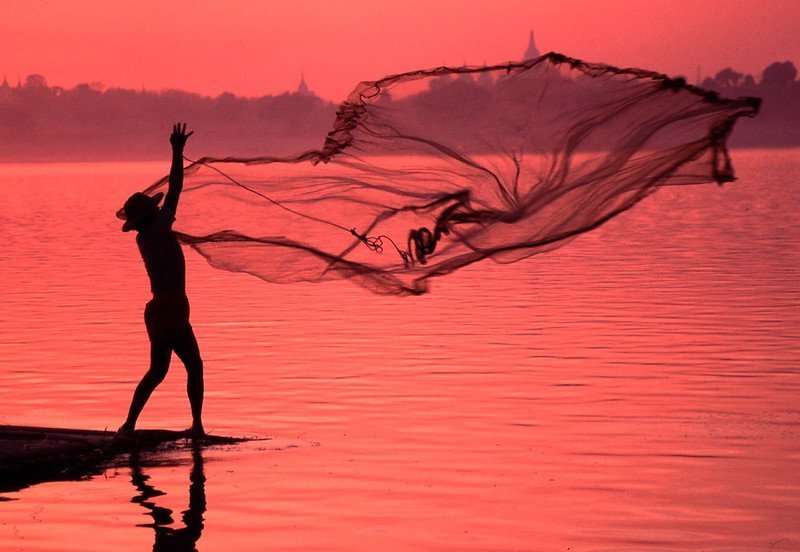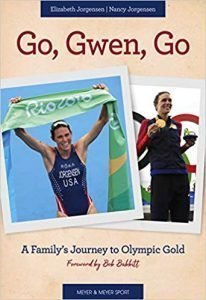
Today’s guest post is by Nancy Jorgensen (@nancyjorgensen), co-author of Go, Gwen, Go: A Family’s Journey to Olympic Gold.
My book is published by a company I never heard of and didn’t query.
After years of writing, workshopping and revising our book, my co-author (who is also my daughter Elizabeth) and I marketed it to agents and publishers. It was the story of Elizabeth’s sister, Gwen, a CPA turned Olympic triathlete.
In our first round of submissions, large publishers and established agents concurred: Sports stories are a tough sell even when the athlete is high profile. Our memoir about a little-known sport, narrated by the Olympian’s mother and sister, gained little traction. Several suggested we rewrite the book, as ghostwriters, in the Olympian’s voice. But our book was more than an Olympian’s story—it was a family story. We stood by our concept.
In a second round of submissions, we received an offer to publish, laden with compliments about our writing. But on closer inspection, we realized we had mistakenly submitted to a vanity press. We declined. Then, a lawyer spotted us on Twitter and pressured us to pay him a large sum in return for “contacts.” We declined him, too.
In our third round of submissions, a publisher sent this reply,
Thank you for your submission of Go, Gwen, Go. Unfortunately, at this time we are unable to publish your title. We feel that your title is not the best fit for our publishing line as we typically do not publish triathlon titles. … We wish you the best success moving forward and hope you find the perfect fit in a publisher. Thank you for your time and consideration. … However, we distribute a publisher that publishes many books on marathons and triathlons. Would you like me to forward your query to them?
Although discouraged, and growing less optimistic with each rejection, we encouraged the editor to forward our query. We also investigated the publisher that specialized in our topic, wondering how we had missed them in our own research. It turns out they’re a European company and so weren’t included in our predominantly domestic lists.
Within a week, Meyer & Meyer Sport, the largest sports publisher in Europe, replied with an offer to publish.
In preparation for submission, we had scoured online sites, bought books that catalogued agents and publishers, paid a coach to improve our query letter and research—and missed a major publisher interested in our book.
 But our hard work was valuable. Because of our wide-ranging queries, we piqued the interest of an editor who knew an editor—someone in the United States who knew someone in Germany, someone who saw promise in our idea and took the initiative to pass along our work. A final deal emerged out of our campaign.
But our hard work was valuable. Because of our wide-ranging queries, we piqued the interest of an editor who knew an editor—someone in the United States who knew someone in Germany, someone who saw promise in our idea and took the initiative to pass along our work. A final deal emerged out of our campaign.
Of the 75 contacts we made, many queries met no response. Only four publishers requested the full manuscript. One agent conversed via email, offering suggestions and support but no representation.
As my daughter and I work on our next book, we use lessons learned from our first collaboration. Although queries and marketing are months away, our first overture will be to Meyer & Meyer Sport. If they don’t have a place for our title, we plan to cast an even wider net than our first one. The more waters we troll, the better chance an agent will bite or direct our idea to another big catch.
Nancy Jorgensen is a musician and writer. Go, Gwen, Go, her memoir of daughter Gwen Jorgensen’s journey from CPA to 2016 Olympic Champion, is published by Meyer & Meyer Sport. Her choral education books are published by Hal Leonard Corporation and Lorenz Corporation. Other works appear or are forthcoming at Prime Number Magazine, Smith Magazine, Cagibi, Milwaukee Journal Sentinel, Crack the Spine, Coffin Bell and elsewhere.

I love this story. Kudos to you, Nancy, for not giving up. This blog post is so inspirational.
Thank you. I am so glad we didn’t give up.
What an exciting run to the finish line! I have a sports bio about a 1936 Olympic hurdler. I wonder if I should query. I didn’t see any submission guidelines. Thanks for this encouraging post.
[…] published can take many different paths. Nancy Jorgensen tells how she caught a publisher unexpectedly, and Anne R. Allen reveals the 1 mistake that leaves self-publishers vulnerable to publishing […]
I tell my clients this often – you will never get to ‘yes’ if you give up. Great story! Congrats!!
My first YA novel sold in a similar fashion in the early 1990s. I submitted to Avon Flare. I received a wonderful letter from an editor telling me that she liked my book, but it wasn’t right for them at that time. However, she thought it might be right for Cora Verlag, a German publisher under the same company umbrella. Did I want her to send it to them for consideration? Of course I did. Cora Verlag bought that book, and the editor at Avon Flare introduced me to my wonderful agent at McIntosh & Otis. My next three books were published by both entities, and then the last one was published only by Avon Flare. Good luck with this next book. Wish me luck, too, as I finish editing a novel for adults after a 20-year hiatus spent writing for a website and now begin shopping a novel around again!
That is a wonderful story! And, yes–good luck with your next book:)
Very inspiring. I’m going through it now with a children’s art education book and reading your account is uplifting. Thanks.
That editor who forwarded your query deserves kisses on both cheeks. 🙂
Love this story! Very encouraging and so true!
Another hearty congrats! More proof that persistence (stubbornness?) pays off.
I had a similar experience with my book-in-progress, a collection of essays about the cult film The Room. It took me about a year to secure a contract, which I obtained with Indiana University Press. A few agents were interested but quickly passed, and most didn’t respond. Since the book has contributions from a lot of academics I moved on to contacting university presses directly. Several said they really liked the idea but felt it was too trade-oriented and didn’t know how to sell it. Essentially the book was too academic for most trade houses but too trade-y for most university presses. The sweet spot turned out to be IUP. They’re large enough to have room for both traditional academic work (hyper-specialized monographs) and more mainstream-focused titles, especially within the realm of pop culture.
All of which is to say, again: Don’t give up without a good fight! I was convinced someone would find my idea worthy and I didn’t stop until I found them. Obviously things don’t always work out, but you’ll never know for sure until you exhaust all of your options.